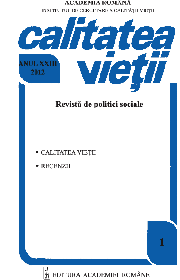Procesul de regionalizare–descentralizare, o analiză pe trei dimensiuni
The process of regionalization–decentralization in Romania, a threefold analysis
Author(s): Iulian StanescuSubject(s): Social Sciences
Published by: Editura Academiei Române
Keywords: decentralisation; regionalisation; development; public opinion; local budgets
Summary/Abstract: This study features an analysis of the regionalization – decentralization process, on three dimensions: public policy, the relationship over time between decentralization and the development gap between the different areas of Romania, and the public opinion on this issue. The public policy dimension focuses on the content of the regionalization – decentralization process through the analysis of social documents, in this case, the three official documents issued by the Cabinet and parliament. The aim of the decentralization process is a substantial transfer of public services, areas of responsibility and funds from the central Government to the local government – regional, county and local councils. A secondary objective, but with maximum visibility, emerges through the regionalization component: the creation of administrative regions. This entails a change of the territorial administrative structure of Romania and requires a revision of the Constitution. The second dimension of decentralization deals with the results up to this point, as revealed by a longitudinal analysis over more than a 15-year period public financing and development indicators, at national and administrative unit level. During this timeframe, development gaps increased dramatically. Through the mechanism governing local budgets, decentralization acted as a accelerator for increasing inequality. Public opinion represents a third dimension on decentralization. The secondary analysis of a nationwide opinion poll on this issue focused on its notoriety, the general attitude of the population and the public opinion depth of the support for decentralization. The general attitude regarding the decentralization bill could be summed up as conformist and positive. The vulnerability of the support for decentralization comes from several sources, such as: the association with the corruption and “local barrons” metaphor, its lack of priority on the public agenda, and the polarization potential of regionalization.
Journal: Calitatea vieţii
- Issue Year: XXV/2014
- Issue No: 2
- Page Range: 161-192
- Page Count: 32
- Language: Romanian

